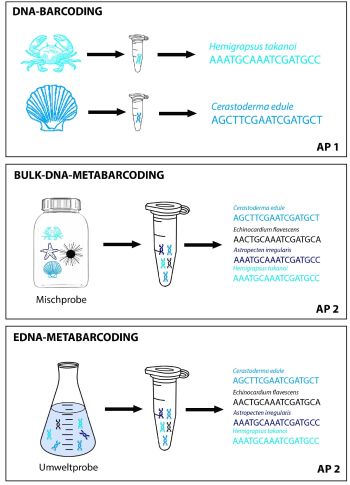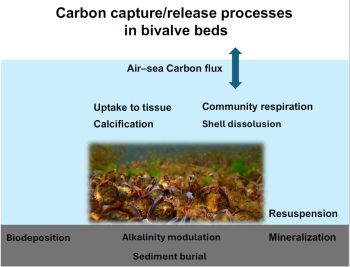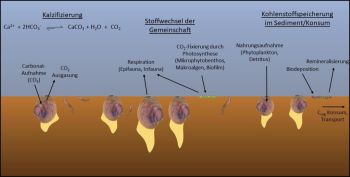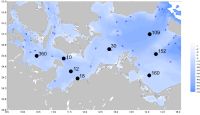
BenthQual (Benthos quality assurance)

Duration: 01.12.2025 - 30.11.2030
As part of the BenthQual project, a comprehensive reference library of the marker gene cytochrome c oxidase I (COI) for macrozoobenthos in the Baltic Sea is being created. The reference library will include all known species of macrozoobenthos in the Baltic Sea (including neobiota). The COI gene provides precise genetic information that enables reliable species identification. Juvenile stages and eggs can also be clearly assigned to a species using this library, which may improve the efficiency and accuracy of species identification in future monitoring.
On the other hand, metabarcoding analyses are also being carried out on a trial basis as part of the project in order to evaluate the applicability of these methods for recording biodiversity in benthic habitats and to check the reference library.
Overall, this project will not only contribute to the expansion of marine biodiversity monitoring in the Baltic Sea, but also provide important insights and benefits for nature conservation, such as early detection of invasive species, long-term monitoring of biodiversity, minimal disturbance, cost efficiency, and the recording of species that are difficult to detect. The results of the project will be published in scientific publications and international databases to promote the use of the reference library in research and nature conservation.
Funded by: Federal Agency for Nature Conservation, BfN
Contact: Dr. Michael L. Zettler
Project coordinator: Dr. Katharina Kniesz
STATUS of the functions of biogenic reefs in the Baltic Sea with a focus on carbon fixation

Duration: 2024 - 2027
The STATUS project is dedicated to understanding and quantifying the carbon sequestration potential of biogenic reefs, particularly mussel beds, in the Baltic Sea. Led by the Benthology group at the Leibniz Institute for Baltic Sea Research, Warnemünde (IOW), and funded by the Federal Agency for Nature Conservation (BfN), the project collaborates closely with the ArKoBi project (focusing on Arctica islandica in the Baltic Sea) and the DEFINE II project of the Alfred Wegener Institute (Bremerhaven), which explores similar themes in the North Sea.
The STATUS project follows a multi-phase workflow. Launched on October 1, 2024, the first year focuses on establishing a foundational understanding of carbon capture, storage, and release processes within Mytilus mussel beds. This phase involves compiling existing data on mussel bed distribution and biomass, paired with a gap analysis to inform subsequent field and experimental research.
In the following phases, STATUS will conduct targeted field and laboratory mesocosm experiments to measure specific carbon fluxes, including biodeposition, sediment carbon burial, and calcification. Using benthic flux measurements and sediment core analyses, the project aims to build a comprehensive carbon budget for mussel beds. Experimental data will support the development of predictive models to simulate how mussel bed ecosystems respond to varying environmental conditions, providing insights into their potential role in climate change mitigation.
STATUS aims to deliver actionable insights for policymakers and marine managers, highlighting the potential of mussel beds as a nature-based solution for carbon sequestration. By contributing to blue carbon strategies, the project seeks to support sustainable management practices that enhance biodiversity and ecological resilience in the Baltic Sea. Through these efforts, STATUS aspires to integrate mussel bed conservation into broader marine protection and climate mitigation initiatives.
Funded by: Federal Agency for Nature Conservation, BfN
Contact: Dr. Michael L. Zettler
Project coordinator: Dr. Laura Fuchs
ArKoBi - Investigation of the contribution of Arctica islandica to the carbon storage and biodiversity in the Baltic Sea (ArKoBi)

Duration: 2023 - 2026
The project ArKoBi is investigating the extent to which the black quahog Arctica islandica and its associated biotopes play a role as a carbon sink (i.e. blue carbon) and how climate change and anthropogenic uses affect their biodiversity, reproduction and population structure and the associated carbon storage capacity. This is not only relevant in terms of species and biotope protection, but is also intended to contribute to federal policy goals for the conservation of biodiversity and climate protection. ArKoBi is working on three main topics: 1) The ecological function of A. islandica and its associated communities as a carbon sink or possibly also a carbon source at the organism and community level, 2) The population and reproduction dynamics of A. islandica in the Baltic Sea, especially in the nature reserve "Fehmarnbelt", their development with increasing environmental changes and anthropogenic uses as well as the consequences on the carbon storage capacity of the habitats, 3) The question whether A. islandica from the North Sea and the Baltic Sea represent genetically different populations and whether the Baltic Sea population reproduces independently. The ArKoBi project combines basic research with marine nature conservation and determines the potential for a further blue carbon ecosystem in the Baltic Sea. The findings can be used to derive possible conservation measures to protect the A. islandica-associated biotopes for both the climate and the environment.
Funded by: Federal Agency for Nature Conservation, BfN
Contact: Dr. Michael L. Zettler
Project coordinator: Dr. Fabian Wolf
HELCOM Monitoring in German Baltic Sea

In the context of a long-term environmental survey by the Helsinki Commission (HELCOM) 9 Baltic Sea stations are sampled annually. The Baltic Sea monitoring is carried out on behalf of the Federal Maritime and Hydrographic Agency (BSH). Results are applied to the MUDAB database of the “Bund-Länder-Mess-Programm” (BLMP) . Monitoring reports are published every year. To consistently assure a high quality standard our team participates in taxonomy workshops and in the macrozoobenthos ring test by the German Federal Environment Agency.